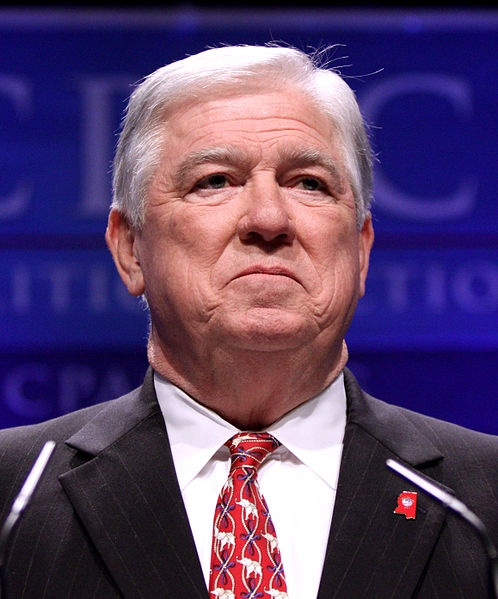In Mississippi, identities of pardon applicants must be public

By Dafna Linzer, ProPublica
The legality of last-minute clemency decisions by outgoing Mississippi Gov. Haley Barbour appears to hinge on whether the recipients gave sufficient public notice of their intent to seek release. The state's attorney-general, Jim Hood, has said there was not proper notice. A state judge, responding to the attorney general's request, temporarily blocked the release of 21 prisoners, ordered by Barbour.
In Mississippi, public notice is a constitutional requirement for acts of clemency, which include pardons, or acts of forgiveness after the completion of a sentence, and commutations, or shortened prison sentences. Under Mississippi law, the notification onus appears to be on the applicant and allows time for victims to comment on a potential pardon or early prison release before it takes effect.
At ProPublica, we recently reported on bias and transparency in presidential pardons, which require no such public notice. The Justice Department keeps the identity of an applicant secret until the president has granted or denied the pardon. But sometimes victims are privately given an opportunity to weigh in. The Justice Department's Office of the Pardon Attorney, which processes pardon claims and makes recommendations to the White House, can seek comments from victims.
At the federal level, most successful pardon and commutation applicants go through a rigorous application and interview process conducted by the pardon office. Although it is rare for a pardon to be granted for someone who has not applied through the pardon office, presidents can pardon anyone charged with or convicted of a federal crime at any time, with or without paperwork.
Marc Rich, for example, did not file an application through the Office of the Pardon Attorney when he sought a pardon in late 2000 from then-President Bill Clinton. Clinton granted the pardon to Rich, a fugitive financier, on his last day in office in January 2001. The Rich pardon was controversial because he had not applied through the pardon office and because his ex-wife was a major donor to Democratic causes and the Clinton presidential library.
Clinton granted nearly 400 pardons during his two-year presidency. George W. Bush granted 189. So far, President Barack Obama has pardoned 22 people.
ProPublica's examination of pardon decisions from 2001-08 found that white applicants were nearly four times as likely to receive pardons than minorities. Other factors, such as financial stability, employment, marital status and the support of a member of Congress, also increased the likelihood of receiving a pardon.
Presidents have also granted few commutations in recent years. Bush granted 11, including one to I. Lewis "Scooter" Libby, who had served as chief of staff to Vice President Dick Cheney and was convicted of perjury and obstruction of justice in a leak case. Obama has commuted the sentence of one person.
Not all governors have the power to pardon. In some states, the power is shared by the legislature and the executive. Some states have set up pardon boards to review applications and either act independently or advise governors of their recommendations.
Pardons are more common in some states than at the federal level. During the period in which Bush pardoned fewer than 200 ex-felons, the governor of Pennsylvania pardoned more than 1,000 people.
Pardons and other acts of clemency can also be controversial and, in some cases, riskier for a governor who may have political ambitions beyond his or her home state. Many federal pardon recipients were convicted of financial or drug-related crimes and very few of violent crimes. One exception during the Bush presidency was a pardon granted to a bank robber who was armed during the crime. But murderers have been pardoned or won early prison release at the state level.
In the court order blocking the 21 pardons, issued Wednesday in Mississippi, Senior Circuit Judge Tomie Green noted that during Barbour's tenure he had granted clemency to individuals convicted of "murder, manslaughter, rape, armed robbery, aggravated assault, sexual assault, kidnapping, burglary, domestic violence, etc."
Barbour's last day in office was Jan. 10. His pardons and commutations, Green's restraining order (PDF) notes, were issued on or just before that day. Some of the individuals who have been or would have been let out of prison early "failed to publish a petition for pardon ... for thirty days prior to the purported pardon granted to them by former Governor Barbour," the order says. Alternately, the order notes, some had failed to prove that they had published a notice.
Among those pardoned were five men convicted of murder. Green concluded that it was possible the clemency acts had violated the state constitution. The 21 will remain behind bars while the order is in effect.
Margaret Colgate Love, who served as the U.S. pardon attorney from 1990-97, said the Mississippi "case seems to be another example of how a governor's failure to observe established pardoning procedures can get him in trouble. It also shows how waiting to the last minute to use the pardon power is a really bad idea."
Barbour was criticized early in his governorship for a lack of pardons, then faced new criticism when he began issuing them. By the time he left the governor's mansion, Barbour had issued more than 200 acts of clemency, more than any recent predecessor.
A 2009 Slate article examined Barbour's decision to release convicted murderers who had been part of a state trusty program that allowed them to work odd jobs around Barbour's official residence. Others pardoned last week appear to have worked in the same program.
Barbour, a former Republican Party chairman and lobbyist, last year had explored running for president but decided against it.
(Photo of Haley Barbour by Gage Skidmore via Wikipedia.)
Tags
ProPublica
ProPublica is an independent, nonprofit newsroom that produces investigative journalism in the public interest.
